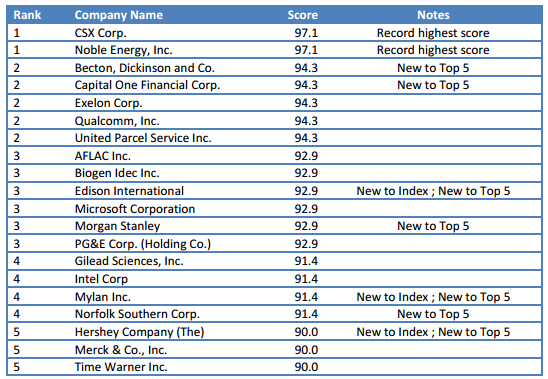The Supreme Court’s 2010 Citizens United ruling opened the gates for corporations, unions and others to pour money into election-related spending, as long as that spending isn’t coordinated with candidates or parties. One result has been a surge in secret spending — so-called dark money, or donations from groups that are not required to disclose the original source of the money. So far, more than $79 million in such outside money has been spent in the 20o14 election cycle, according to the Center for Responsive Politics.
Yet even as dark money makes politics less transparent, the largest publicly traded U.S. companies are becoming more open about their political spending, according to an annual survey released Wednesday by the nonpartisan Center for Political Accountability and the Zicklin Center for Business Ethics Research at the University of Pennsylvania’s Wharton School.
“Although surging secret spending has fueled public suspicion and even allegations of political scandal, many of the nation’s leading public companies have announced opposition to the practice,” the report says. “By standing up for sunlight and adopting public disclosure policies, they are laying the foundation for a new route to political disclosure.”
Related: The Shadowy World of ‘Dark Money’ Campaign Spending
The study rated the political spending and disclosure practices of the top 300 companies in the S&P 500. It looked at 24 criteria, such as whether a company has a board committee to review political expenditures or whether it publicly divulges payments to trade associations or tax-exempt groups that could then be used for political purposes. Other scoring criteria include whether a company has a dedicated political disclosure web page that can be found through search or within three mouse clicks from the homepage.
Of the nearly 200 companies examined both this year and last, more than half received better scores for their disclosures in 2014 than they had in 2013. Six in 10 of the companies in the study now disclose political contributions made directly to candidates, parties and committees, and 43 percent put out some information about payments to trade associations.
The two companies that topped the rankings, rail network operator CSX Corp and Noble Energy, received the highest scores in the four-year history of the index. See the table below for the 20 top-ranking companies.

At the other end of the spectrum, companies including Warren Buffett’s Berkshire Hathaway, Netflix, Keurig Green Mountain, Salesforce.com, Intuitive Surgical and financial firms T Rowe Price Group and Charles Schwab all ranked among the 20 least transparent about their political spending. For the full rankings, see the report here.
Related: One Sure Way to Get the Do-Nothing Congress to Do Something
The tech and financial names on that list speak to the relatively poor disclosure records for those industries more broadly. While companies in the utilities, health care and materials industries fared best in the rankings, the information technology, financial and consumer discretionary sectors ranked lowest.

Groups like the U.S. Chamber of Commerce, the Business Roundtable and the Center for Competitive Politics have pushed back against the emphasis on disclosure and suggested that campaigns to pressure companies into further disclosure are really aimed at limiting political participation and speech by businesses.
“The Index is nothing more than a tool for activists to demand increased disclosure and perpetuate the facade that the business community is embracing increased disclosure as a ‘corporate best practice,’” the Center for Competitive Politics said in a statement.
Bruce Freed, president of the Center for Political Accountability and an author of the new report, dismissed that criticism and said more companies are taking disclosure seriously. "We've had companies say to us that disclosure brings greater discipline in how they handle their campaign giving and how they handle their money," he said.
Top Reads from The Fiscal Times:




